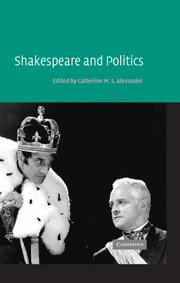Book contents
- Frontmatter
- Contents
- List of contributors
- Editor's note
- 1 Shakespeare and politics: an introduction
- 2 Shakespeare and politics
- 3 Henry VIII and the deconstruction of history
- 4 Livy, Machiavelli, and Shakespeare's Coriolanus
- 5 Richard II and the realities of power
- 6 Plutarch, insurrection, and dearth in Coriolanus
- 7 Some versions of coup d'état, rebellion, and revolution
- 8 Language, politics, and poverty in Shakespearian drama
- 9 ‘Demystifying the mystery of state’: King Lear and the world upside down
- 10 Venetian culture and the politics of Othello
- 11 The Bard and Ireland: Shakespeare's Protestantism as politics in disguise
- 12 Henry V as working-house of ideology
- 13 ‘Fashion it thus’: Julius Caesar and the politics of theatrical representation
- 14 Take me to your Leda
- 15 Macbeth on film: politics
- 16 William Shakespeare's Romeo + Juliet: everything's nice in America?
- Index
8 - Language, politics, and poverty in Shakespearian drama
Published online by Cambridge University Press: 05 June 2012
- Frontmatter
- Contents
- List of contributors
- Editor's note
- 1 Shakespeare and politics: an introduction
- 2 Shakespeare and politics
- 3 Henry VIII and the deconstruction of history
- 4 Livy, Machiavelli, and Shakespeare's Coriolanus
- 5 Richard II and the realities of power
- 6 Plutarch, insurrection, and dearth in Coriolanus
- 7 Some versions of coup d'état, rebellion, and revolution
- 8 Language, politics, and poverty in Shakespearian drama
- 9 ‘Demystifying the mystery of state’: King Lear and the world upside down
- 10 Venetian culture and the politics of Othello
- 11 The Bard and Ireland: Shakespeare's Protestantism as politics in disguise
- 12 Henry V as working-house of ideology
- 13 ‘Fashion it thus’: Julius Caesar and the politics of theatrical representation
- 14 Take me to your Leda
- 15 Macbeth on film: politics
- 16 William Shakespeare's Romeo + Juliet: everything's nice in America?
- Index
Summary
In an essay published in Shakespeare Survey 38, the historian E. W. Ives analysed the ways in which history and literature mutually illuminated (or did not) each other in the study of Shakespeare. After reviewing the distressing conditions of poverty during Shakespeare's lifetime, Ives concluded that ‘to the historian, the remarkable thing – and a contrast to Shakespeare's sensitivity to the realities of politics and the Court – is the distance there seems to be between his plays and the socio-economic realities of Elizabeth[an] and Jacobean England’. Coriolanus, Ives notes, ‘stands alone’ as an exception, and in any event ‘takes very much an establishment point of view’. Yet it is possible, Ives concedes, ‘to show by a study of language and imagery that Shakespeare was aware of much of this, but it gave him few explicit themes’. There is much to agree with in Ives's essay, particularly his argument that ‘the reaction against literary evidence in history has gone too far’, but there is so much to disagree with in the passages I have quoted that it is difficult to know where to begin. Leaving aside the myriad contradictions and curious theoretical assumptions of Ives's argument, I want to suggest that Shakespeare's language not only reveals his sensitivity to the discourse of poverty in his day, but that his language, in crucial instances, is his ‘theme’. After some general remarks, I will proceed with three particular examples, two of which Ives does not mention in his essay.
- Type
- Chapter
- Information
- Shakespeare and Politics , pp. 142 - 154Publisher: Cambridge University PressPrint publication year: 2004
- 1
- Cited by

